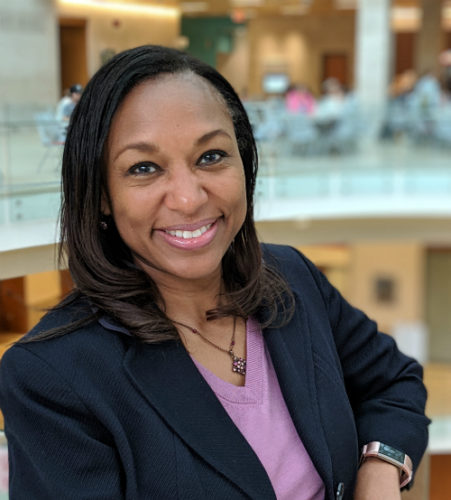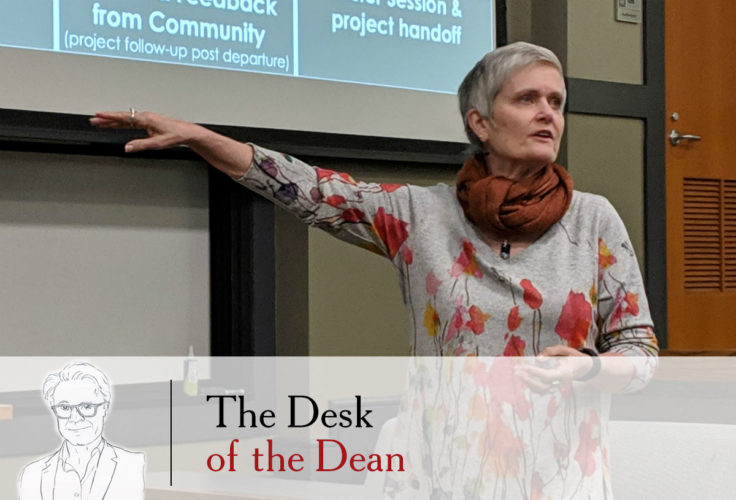In research and in practice, the results are unambiguous and incontrovertible: Organizations perform better when they welcome, embrace and foster diverse points of view. For this and myriad other reasons, creating an environment which includes and supports a diversity of voices and perspectives is the right thing to do.
Yet at the end of this millennium’s second decade, our society still falls short. We need not look far to find examples of corporate missteps in marketing or product development because planners failed to include a diverse set of voices.
This issue is near and dear to my heart. I’m gratified to be at a school that long ago recognized the importance of racial equity in business education by founding the Consortium for Graduate Study in Management.
And I believe we’ve made strides here at WashU Olin by improving the gender balance among students, attracting an increasing number of top women to the faculty, increasing the number of female full professors and advocating for additional endowed teaching chairs for women.
I recognize, however, that as a top business school, there is much more we can do. Building diversity, equity and inclusion is work we should be leading. We cannot assume we’re doing the right thing. We must address issues of inclusion, unconscious bias and institutional inequity with deliberation and forethought.

That is why I recently created two new positions at Olin dedicated to this work. Several months ago, I appointed Judi McLean Parks, the Reuben C. and Anne Carpenter Taylor Professor of Organizational Behavior, into the new role of associate dean for diversity and inclusion.
And on April 1, Olin’s former registrar, Jacqueline Slack Carter, started her new role as diversity and inclusion officer based in the dean’s office and supporting Judi.
Judi’s role formalizes and expands work she has already done at Olin and dovetails thoroughly with her research interests. Jackie has a demonstrated commitment to this work through numerous on- and off-campus activities including her advocacy for Consortium students, service on numerous university committees and membership in the St. Louis Business Initiative and the Diversity Awareness Partnership.
“I realize this will be a lot of work to change mindset and institutional culture, but it will be transformative work that will have an impact,” Jackie said. “I want to be a part of creating a new story—that we are intentional about providing access and equity for all and where all voices are heard and all are seen.”
Judi is already hard at work again on an initiative she’s pioneered at Olin, a biennial faculty development workshop that brings young, junior faculty from various institutions to our campus for workshops in research presentation, salary negotiation and networking. The June workshop helps develop young faculty and builds the hiring pipeline for research institutions such as WashU Olin.
She’s been meeting with and gathering information from the leaders of various race-, nationality- and gender-based affinity groups and she plans to host—along with Jackie—a series of broader listening sessions.
“My hope is that we can do more to level the playing field at Olin and make it a more welcoming culture for everyone,” Judi said. “It’s not that it’s not. It’s just there are things we can do to continue moving in that direction.” How well do faculty case studies reflect diverse viewpoints, for example? What more can we do to expand and diversify the voices we have on our faculty?
“There’s often a lot of resistance to diversity training,” Judi said. “You often feel like you’re preaching to the choir. But you can do the training in ways that help the person who is being underrepresented to help level the playing field.” I am grateful for the work Judi and Jackie have already put forth. They are both committed to taking a proactive approach toward driving growth in diversity and equity at WashU Olin. Consider this to be the first word on the subject—certainly not the last.
Pictured above: Judi McLean Parks, newly appointed associate dean for diversity and inclusion, presents at a recent “lunch-and-learn” for Olin staff and faculty.



